John Fritze, USA TODAY
Mon, November 7, 2022
WASHINGTON – Some of Autumn Adams' most vivid childhood memories involve sitting in a courtroom or talking with child protective services after her father died, her mother was deemed unfit to be a parent and she was thrust suddenly into foster care.
Adams was 9 years old.
Looking back, she partly credits a 1978 law setting special rules for custody of Native American children for helping her navigate the trauma of that time. The law, which prioritizes Native American families for the custody of Native children, meant she was able to keep her bond with the Yakama Nation even as the rest of her world fell apart.
Adams was placed with an aunt and then a grandmother, both of whom lived on the Yakama Reservation in Washington state.
"Having that connection not only to my family but to my culture through my family members, I was able to pull through one of the darkest and most trying times in my life," said Adams, now in her second year of law school at Arizona State University. "I was able to rely on my culture to pull me through and keep me grounded."
The Supreme Court will hear arguments Wednesday in a case challenging that law, the Indian Child Welfare Act, which Congress approved to stop a decadeslong practice of attempting to assimilate Native American children by removing them from their tribes and placing them with non-Native families or in boarding schools.
Non-Native families who have sought to adopt Native American children say the law violates the 14th Amendment because it gives a preference to one race over others. The original plaintiffs in the case, which also included the states of Texas, Indiana and Louisiana, argued Congress overstepped its authority by passing a law that sets requirements for state child-custody proceedings. Indiana and Louisiana later dropped off the litigation.
If a majority of the court agrees with that view, it will once again put race front and center at the nation's highest court. The nine justices are already weighing a potentially monumental challenge to affirmative action, as well as a case involving the use of race in the once-a-decade process of congressional redistricting.
Critics say the law, however well-intentioned, can wind up harming Native American children in other circumstances, such as by setting a higher legal standard for removing them from abusive households. The Goldwater Institute has called attention to cases in which a child was killed after being returned to biological parents under the law.
"State officials are forced to send Indian children back to a home they know to be abusive, which would not happen in cases involving children of other races," said Timothy Sandefur, vice president for legal affairs at Goldwater, a conservative think tank that has represented clients opposed to the law in other cases.
Another problem Sandefur sees: tribal leadership stepping in to oppose adoptions under the law even if there aren't available options for placement with Native families.
"Because of an ideological opposition to Indian children being adopted by any other race, these children end up bouncing from one foster home to another," he said.
Leaders of several of the nation's best-known tribes, joined by the Biden administration, have rejected that argument. Proponents say the law's requirements are based not on race, but rather that Native American tribes are sovereign. Congress, they argue, has broad power to pass laws protecting Native Americans.
Gorsuch: Native Americans are winning at the Supreme Court with help from Gorsuch
Decision: Tribal police may detain non-Native Americans on reservation highways
Oklahoma: Supreme Court sides with Oklahoma over crimes on Native territory
They see the lawsuit as an attack not only on their sovereignty, but also on their children, who they say benefit most when placed with their families and communities.
"We will not go back to a time when our children were stolen from our communities without cause," Charles Martin, chairman of the Morongo Band of Mission Indians in California, said during a call with reporters last month.
The law has in the past divided the Supreme Court in unpredictable ways. In 2013, a 5-4 majority sided with a 3-year-old girl's non-Native adoptive parents over a claim made by her biological father, who was a member of the Cherokee Nation and had objected to the adoption after the fact. In an opinion written by Associate Justice Samuel Alito, a conservative, the court ruled that a noncustodial parent could not invoke the law.

A law enforcement official stands on the steps of the U.S. Supreme
The child involved in that case, who was widely known as "Baby Veronica," was considered Native American because she was 3/256ths Cherokee.
Alito's opinion was joined by Associate Justice Anthony Kennedy, then the court's swing vote, and Associate Justice Stephen Breyer, a liberal. Associate Justice Clarence Thomas wrote a concurring opinion raising more fundamental concerns with the law.
While that case suggests some members of the court's conservative majority are skeptical of the law, that may not be a universal position. Associate Justice Neil Gorsuch, who joined the court in 2017, has frequently sided with Native American interests even when that has meant breaking from his conservative colleagues.
Other associate justices to watch: Brett Kavanaugh, Amy Coney Barrett and Ketanji Brown Jackson, all of whom joined the court after the 2013 decision.
Both Barrett and Chief Justice John Roberts are adoptive parents.
The appeal follows a deeply fractured opinion from the U.S. Court of Appeals for the 5th Circuit, which split evenly on several of the law’s provisions. The result upheld a federal district court’s determination that some provisions of the law are unconstitutional.
Native American tribes have secured a number of high-profile victories at the Supreme Court in recent years, including a 5-4 decision in 2020 that ruled Congress never disestablished the Muscogee (Creek) Nation's reservation, an area that encompasses 3 million acres and hundreds of thousands of non-Natives.
That decision vastly expanded what is considered Native territory in Oklahoma.
But last year, in an opinion written by Kavanaugh, the court backed Oklahoma over the same tribe in a struggle for jurisdiction over certain crimes on Native American land. The big difference between those two cases: Associate Justice Ruth Bader Ginsburg, who backed the tribe in 2020, died months later. She was succeeded by Barrett, who voted for the state instead of a criminal defendant who argued that the state lacked the authority to prosecute a crime that took place on Native land.
This article originally appeared on USA TODAY: Supreme Court tackles race, Native American history in adoption fight
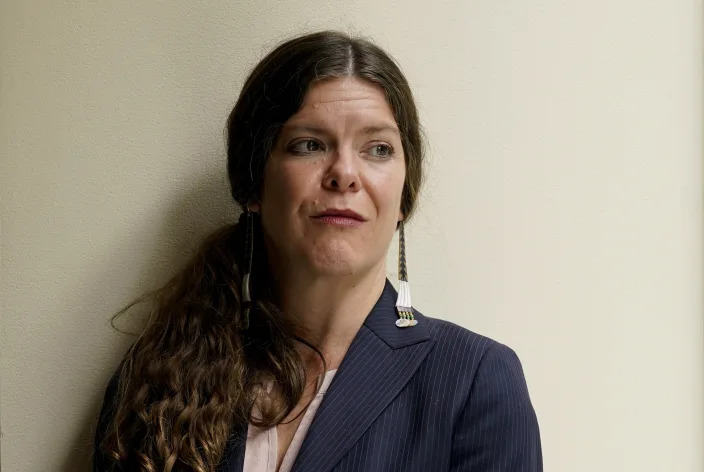
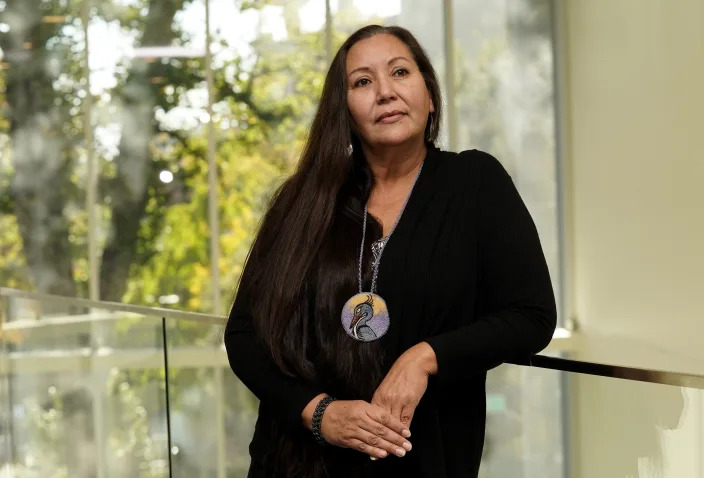

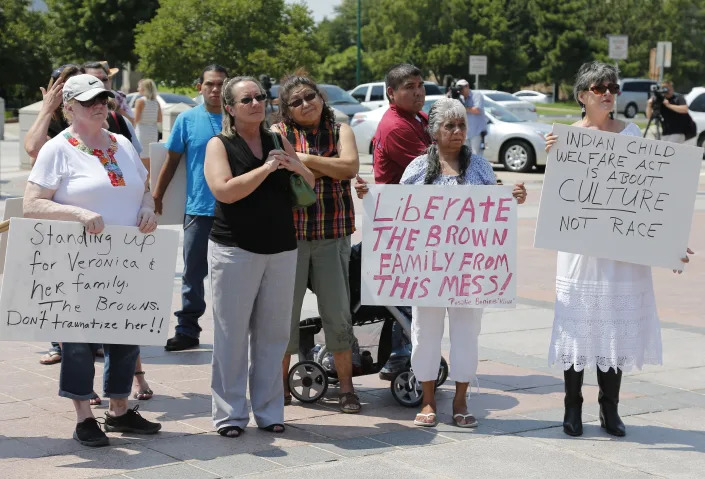
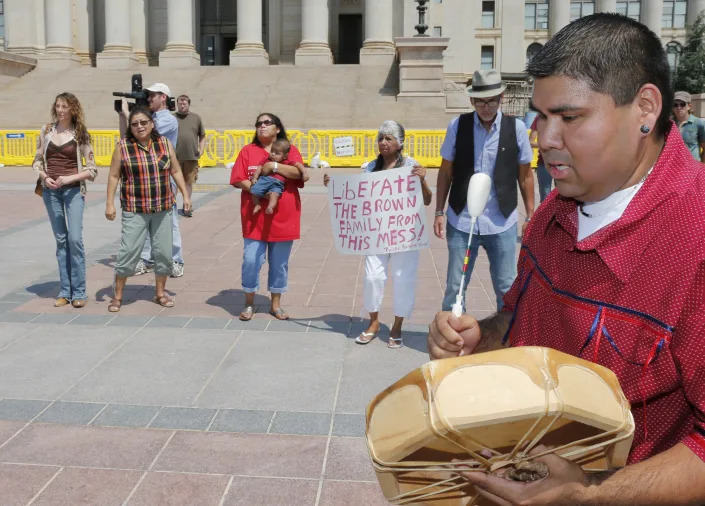
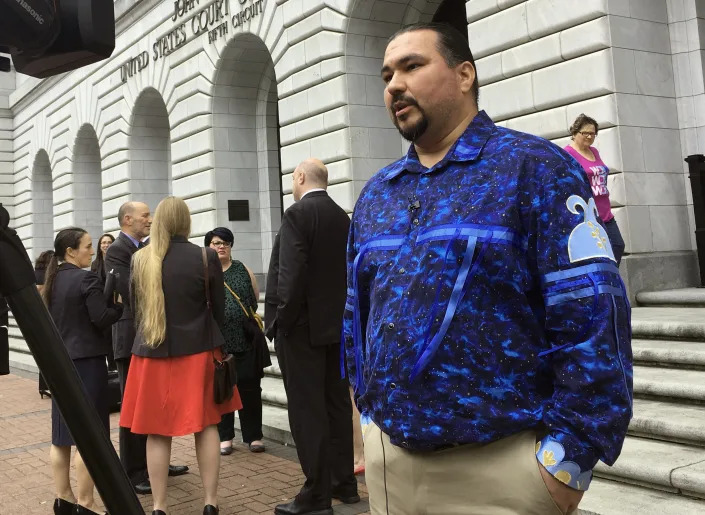
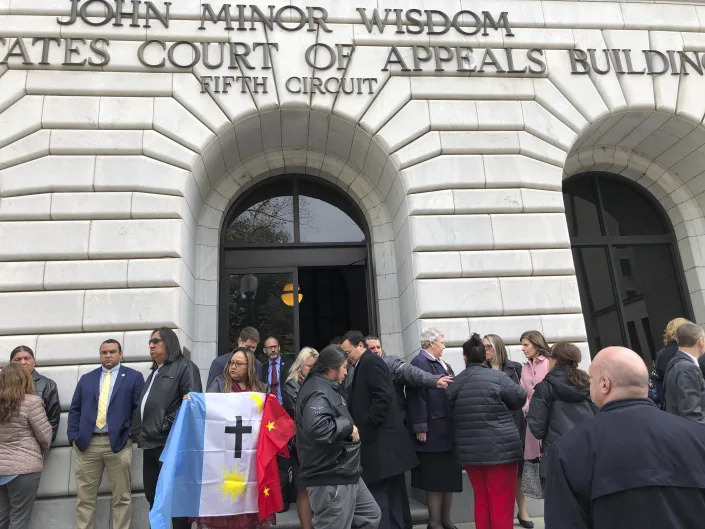
Rosa Soto Alvarez, of Tucson,, holds a flag of the Pascua Yaqui Tribe as she and other Native Americans stand outside the federal appeals court in New Orleans, Wednesday, Jan. 22, 2020. Parts of a federal law giving Native American families preference in the adoption of Native American children were effectively struck down Tuesday, April 6, 2021 by a sharply divided federal appeals court, a defeat for tribal leaders who said the 1978 law was important to protecting their families and culture. The U.S. Supreme Court will hear arguments, Wednesday, Nov. 9, 2022 on the most significant challenge to the Indian Child Welfare Act that gives preference to Native American families in foster care and adoption proceedings of Native American children since it passed in 1978.
Sun, November 6, 2022
FLAGSTAFF, Ariz. (AP) — The U.S. Supreme Court is set to hear arguments Wednesday on the most significant challenge to a law that gives preference to Native American families in foster care and adoption proceedings of Native children.
The outcome could undercut the 1978 Indian Child Welfare Act, which was enacted in response to the alarming rate at which Native American and Alaska Native children were taken from their homes by public and private agencies. Tribes also fear more widespread impacts in the ability to govern themselves if the justices rule against them.
The law requires states to notify tribes and seek placement with the child’s extended family, members of the child’s tribe or other Native American families. It’s long been championed by tribal leaders as a means of preserving their families, traditions and cultures.
Three white families, Texas and a small number of other states claim the law is based on race and is unconstitutional under the equal protection clause. They also contend it puts the interests of tribes ahead of children. Lower courts have been split on the case.
“This is an all-out nuclear war attack on ICWA,” said Mary Kathryn Nagle, a Cherokee attorney for the National Indigenous Women's Resource Center who filed a brief in support of the law. “We have not seen that before. That’s either ironic or interesting, because the law has been on the books for 44 years, and this is the first time the constitutionality of the law has been challenged. This is unprecedented."
More than three-quarters of the 574 federally recognized tribes in the country have asked the high court to uphold the law in full, along with tribal organizations. They fear widespread impacts if the court attempts to dismantle the tribes' status as political sovereigns.
Nearly two dozen state attorneys general across the political spectrum filed a brief in support of the law. Some of those states have codified the federal law into their own state laws.
“We disagree on many things,” the brief reads. “But we all agree that ICWA is a critical — and constitutionally valid — framework for managing state-tribal relations, protecting the rights of Indian children, and preventing the unwarranted displacement of Indian children from their families and communities.”
Texas, Louisiana, Indiana and seven individuals have sued over the provisions of the law, though not all are involved in the case before the high court. The lead plaintiffs in the Supreme Court case — Chad and Jennifer Brackeen of Fort Worth, Texas — said the law doesn't have the best interest of children at heart.
“It’s important for people to understand that this is not just a law," Jennifer Brackeen, an anesthesiologist, said in an interview with The Associated Press.
She and her husband, Chad, adopted a Native American child after a prolonged legal fight with the Navajo Nation, one of the two largest Native American tribes, based in the U.S. Southwest. They are trying to adopt the boy’s half-sister, now 4, who has lived with them since infancy. The Navajo Nation has opposed that adoption.
A major problem with the law, Chad Brackeen said, is its lack of flexibility.
“We feel primary consideration is that all children, regardless of race, should be placed in loving forever homes,” Jennifer Brackeen said.
A federal district court in Texas initially sided with the group of plaintiffs in 2018 and struck down much of the Indian Child Welfare Act, ruling it was race-based and unconstitutional.
But in 2019, a three-judge federal appeals court panel voted 2-1 to reverse the district court and uphold the law. The full court then agreed to hear the case and struck down some of the provisions, including preferences for placing Native children with Native adoptive families and in Native foster homes. It also said Congress overstepped its authority by imposing its will on state officials in adoption matters.
But it upheld the determination that the law is based on the political relationship between the tribes and the U.S. government, not race.
The high court has twice taken up cases on the Indian Child Welfare Act before, in 1989 and in 2013, that have stirred immense emotion.
All of the children who have been involved in the current case at one point are enrolled or could be enrolled as Navajo, Cherokee, White Earth Band of Ojibwe and Ysleta del Sur Pueblo. Some of the adoptions have been finalized while some are still being challenged. How those are affected by the Supreme Court case could depend on how the high court rules.
Before the Indian Child Welfare Act was enacted, between 25% and 35% of Native American children were being taken from their homes and placed with adoptive families, in foster care or in institutions. Most were placed with white families or in boarding schools in attempts to assimilate them.
“They would just swoop in and take our kids,” said Michelle Beaudin, a council member of the Lac Courte Oreilles Tribe in Wisconsin. “And they didn't know their culture, they were just brought into another world. There was no justification for them to come into our communities."
Kate Fort, who represents intervening tribes in the case, said Native American children remain disproportionately represented in the system, but the actual figures vary dramatically by state.
“It’s better than when ICWA was passed, but we still have work to do,” she said in a recent call with reporters.
Beaudin, who was a foster care parent for more than 10 years, adopted her now 22-year-old daughter. She saw great value in ensuring that her daughter stayed connected to both her Ojibwe and Ho-Chunk heritage by passing down traditional skirts and participating in cultural ceremonies.
“That really helped her be confident in who she is and where she came from,” Beaudin said. “She had those pieces of her. If you don't know where you came from and who your people are and what your culture is about, you don't have a sense of belonging anywhere.”
___
___
Maintain tribal authority over adoption of Indigenous children
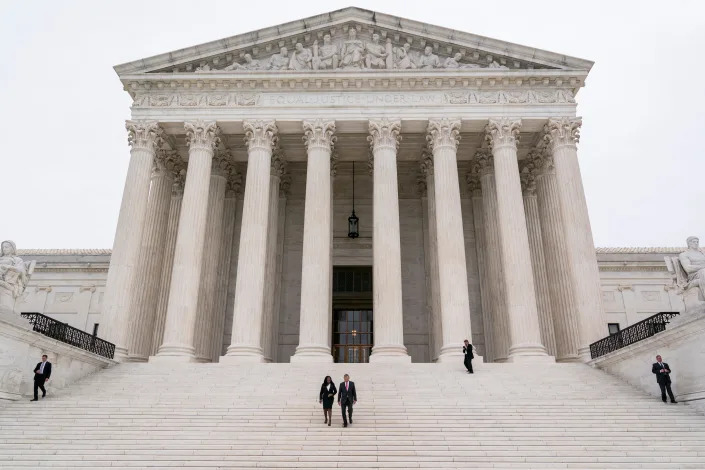
1
Kitty Miller, Anna Lawson, Martha Phillips and John Maddaus
Sun, November 6, 2022
On Nov. 9, the U.S. Supreme Court will hear oral argument in Haaland v. Brackeen, a case brought by three states and individual prospective non-Indian adoptive parents. It challenges the constitutionality and provisions of the Indian Child Welfare Act (ICWA), enacted in 1978 to ensure tribal authority over the adoption of Indigenous children. ICWA addressed the then-common removal of Indian children from their homes and placement with non-Native families, a practice so widespread and disproportionate to similar actions among non-Native children that it showed grave lack of understanding of tribal cultures and the vital role of Native extended families. This caused a serious threat to tribal survival.
Brackeen contains a radical attack on the entire body of federal Indian law. It argues the federal concept of “Indian” is based on a racial classification that violates the equal protection of the 14th Amendment. This contradicts the history of tribal sovereignty in federal courts, which have consistently held that “federal legislation with respect to Indian tribes ... is not based on impermissible racial classifications” (U.S. v. Antelope, 430 U.S. 641, 1977). "Indian" is a political classification based on membership in a federally recognized tribe. This distinction flows from the Supremacy Clause of the U.S. Constitution, which gives the federal government exclusive authority over relations with Indian tribes. Any limitation on this federal authority would negate federal ability to fully administer its trust responsibility. Brackeen also challenges ICWA’s placement preferences and regulations promoted by the Bureau of Indian Affairs.
The three plaintiff states in Brackeen (Texas, Louisiana, Indiana) have tiny Indian populations. Many parties have filed “friend of the court” briefs supporting ICWA: 497 tribes, 62 tribal organizations, 27 states containing 94 percent of all federally recognized tribes, and many child welfare organizations. New Mexico is home to 23 sovereign tribal nations — 19 Pueblos, three Apache tribes, the Navajo Nation — each of which is culturally distinct. In 2022, the New Mexico Legislature enacted the Indian Family Protection Act, which incorporated many of the provisions of ICWA into state law.
As people of faith, Christian churches have a special responsibility to protect ICWA because of the roles we have historically played in forcibly taking Native children from their homes to draconian boarding schools whose goal was to eliminate tribal languages and cultures, and often resulted in Native children’s deaths. We must stand with our Indigenous siblings. We urge Christians to support ICWA to protect tribal sovereignty and authority over tribal adoptions and children’s protection. Our church (First Congregational Church, United Church of Christ, Albuquerque) is honored to join the excellent friend of the court brief by the National Indigenous Women’s Resource Center, Stephanie Benally and Sandy White Hawk, et al., in this case. We’re proud to live in one of the 10 states that have enacted laws protecting tribal authority over adoptions of Native children. As ICWA states, “(t)here is no resource ... more vital to the continued existence of Indian tribes than their children.”
Kitty Miller, Anna Lawson, Martha Phillips and John Maddaus are members of the First Congregational Church, United Church of Christ Racial Justice Team in Albuquerque.
This article originally appeared on Las Cruces Sun-News: Commentary: Maintain tribal authority over adoption of Indigenous children
FAIR AND BALANCED
FOX SUPPORTS 'WHITE' ADOPTIVE PARENTS
Supreme Court to hear case of Texas couple fighting to keep adopted Native American child
The Supreme Court this week will hear the case of a Texas family at risk of losing one of their two adopted Native American children because of a federal law they allege gives tribes "race-based" priority in custody disputes.
The case, Haaland v. Brackeen, combines litigation from a handful of other families and multiple interested states, including Texas, where Chad and Jennifer Brackeen live with their children. The tribes defending the law, meanwhile, warn that if the Brackeens win, the case could have far-reaching consequences that undermine their sovereignty.
At the center of the controversy is the Indian Child Welfare Act (ICWA), a 1970s law meant to protect Native American children in state custody proceedings.
"There are Americans out there who are eager to help these children out, and the Indian Child Welfare Act says they are not allowed to because their skin is the wrong color," Timothy Sandefur, an adjunct scholar at the libertarian Cato Institute, told Fox News Digital.

"That's outrageous and unconstitutional," he said. Sandefur wrote a brief for the Goldwater institute supporting striking down ICWA.
ICWA was a reaction to high rates of Native children being adopted by non-tribal members – often with little process and unjustly.
It prioritizes placing Native children with extended family members, members of their tribe, and if that's not possible, with another Native family. Exceptions for "good cause" are allowed but not defined.
Tribes argue that their children are key to their continuation as political entities and that their unique status under U.S. law means legislation directed at the tribes isn't race-based.
"The precedent of the Supreme Court is that Indian tribes are political groups of people, they are not racial groups of people," Chrissi Ross Nimmo, the deputy attorney general of Cherokee Nation, told reporters last month. "Tribes determine citizenship ... just like countries."
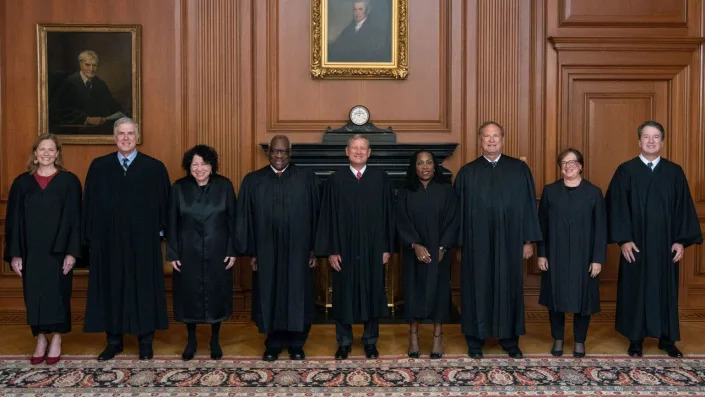
But critics of the law say it removes the best interest of a child, including staying with adults they've known for some time, in favor of placing a child with anyone of the same or a similar race.
"No other federal law that is triggered by a child's biological eligibility for tribal membership," Sandefur said. "Every other Indian law on the books applies to a person because that person is a member of a tribe."
"Congress’s racial discrimination is ‘most evident’ in ICWA’s third placement preference … which bluntly favors any ‘Indian famil[y]’ from any of 574 tribes over any non-Indian family," a brief from the Brackeens' lawyers says.
Chad and Jennifer Brackeen's journey to the Supreme Court began when Navajo Nation sought to place their adopted son, referred to in court documents as A.L.M., with unrelated tribal members who lived in a different state.
The family to whom the Navajo Nation wished to send A.L.M. stepped back from the proceedings, and the Brackeens won custody. But their adoption saga continued after A.L.M.'s mother gave birth to his half-sister, known as Y.R.J.
The biological mother supported placement with the Brackeens. But Navajo Nation sought to place Y.R.J., according to the Brackeens' lawyers, "in another state hundreds of miles away with either a great-aunt or an unrelated Navajo couple."
That case is still in a state court in Texas. But the Brackeens' lawyers say the result of their Supreme Court case, which stemmed from their fight to keep A.L.M., will likely decide the result of Y.R.J.'s case and thus the future of their family.
"Our children are young, our oldest is 13, the baby sister is 4 and a half. So, to some degree, only the oldest are fully aware of what we're going through," Chad Brackeen told Fox News Digital. "And it's our responsibility to sort of shield our children at this point of the uncertainty, that she could ultimately be taken, ripped from our home and moved states away."
Another major issue Sandefur said the case could turn on is whether ICWA unconstitutionally commandeers state courts to implement federal policy.
"ICWA is the only federal law in existence that is exclusively enforced by state officials. The feds don't enforce ICWA," Sandefur said. "But our federalist system under our constitution prohibits Congress from compelling states to enforce laws against their will."
Lawyers backing top tribal leaders, however, say the consequences for Native Americans could go far beyond adoption disputes if the justices rule against them.
Kate Fort, the director for the Indian Law Clinic at Michigan State University, called the case a "facial attack on tribal sovereignty." She also said it could "lead to a fundamental re-understanding of how Congress can or cannot pass laws for tribes."
Fort said other litigants suing over an alleged gambling monopoly for Native Americans in Washington state are already mimicking the arguments used in the Brackeen case.
Oral arguments are scheduled for Wednesday, with an extended hearing set to last nearly two hours due to the number of parties.
Unlike many politicized cases, the court may not split directly along ideological lines. Tribal law is a subject on which the justices at times may form unusual alliances to decide a case.
"A lot of people are particularly interested in how Justice Gorsuch is going to look at this case, because he has a reputation for being very sensitive to… Indian law issues," Sandefur said.
No comments:
Post a Comment